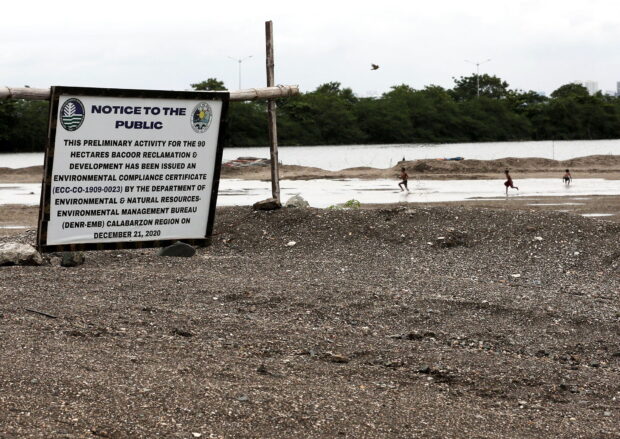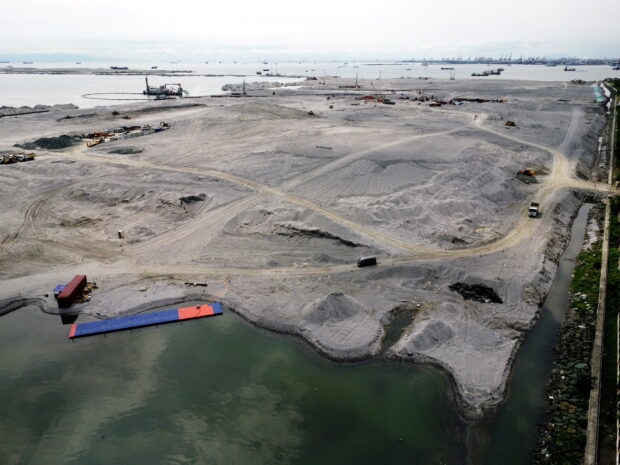DENR tapping more experts to study reclamation impact

NEW PLAYGROUND | A group of children finds a new spot to spend their Sunday afternoon in this reclaimed area in a section of Manila Bay in Bacoor City, Cavite. This particular reclamation project was granted an environmental compliance certificate by the environment department in 2020. (Photo by RICHARD A. REYES / Philippine Daily Inquirer)
MANILA, Philippines — The Department of Environment and Natural Resources (DENR) has tapped the services of marine experts and scientists to determine the potential environmental risks posed by various reclamation projects in Manila Bay.
“At this point, let me be frank with you. We are seriously concerned [about] the level of science and level of evaluation that is available to us as [to whether] the department can meet up with the challenges on marine biodiversity,” Environment Secretary Maria Antonia Yulo Loyzaga told reporters on Monday.
She said that aside from marine biodiversity, there was also a need to evaluate chemical oceanography or the composition of water in the ocean, and how reclamation activities affect marine life.
“All of these are interrelated and what we’re doing right now is really to build capacity,” Loyzaga said, adding that the DENR has reached out to different higher education institutions like the University of the Philippines-Marine Science Institute.
It was also forming a team led by local scientists for the “cumulative impact assessment” of ongoing reclamation projects in Manila Bay.
“There will be a composite team, different disciplines represented by Filipino scientists with advisory from foreign experts as well. We want to assemble the team by August and many of [them] have been involved in assessing the Manila Bay reclamation,” Loyzaga said.
On May 8, the DENR conducted an experts forum on reclamation with scientists, academicians, government officials and representatives of civil society organizations who highlighted the need for cumulative assessment and “valuation studies.”
Baseline studies needed
One of the points brought up by the panelists, according to the DENR, was the need for the government and project proponents to jointly come up with baseline studies that would examine the changes brought about by reclamation activities.
While the DENR’s initiative to review more than 20 reclamation projects was welcomed by environmental and fisherfolk groups, they reiterated their call for the agency to revoke the permits of developers pending the results of its assessment.
But Loyzaga had pointed out before that the DENR could not just declare the projects illegal and cancel permits.
“What we’re doing in the DENR is we’re reviewing what has already been permitted. We’re trying to understand how the lessons learned from these activities can actually inform actions and policies moving forward,” she said.
On the sidelines of the DENR’s multistakeholder experts’ dialogue on reclamation on Monday, she pointed out the importance of articulating the perspective of different sectors.

TAKING SHAPE | Reclamation of this section of Manila Bay along J.W. Diokno Boulevard in Pasay City has been ongoing, as shown in this photo taken on June 25. 2023. Environmental advocates have expressed alarm over the impact of reclamation activities on Manila Bay’s marine biodiversity. (File photo by GRIG C.MONTEGRANDE / Philippine Daily Inquirer)
“In the previous permitting processes, there was not much transparency nor was it consultative in terms of trying to include the many expertise we have,” she said.
This time, with the help of Filipino scientists leading the cumulative impact assessment team, the DENR aims to come up with a “holistic” evaluation of the ecosystems affected by reclamation activities.
“We have ecosystem services like flood management from mangroves which may disappear if we don’t include them in the evaluation and assessment of these projects,” Loyzaga said.
Policy gaps
Environment Undersecretary Jonas Leones, on the other hand, identified the policy gaps among agencies involved in the evaluation of and issuance of permits to reclamation projects.
These include the policy on the easement of reclaimed lands—the Philippine Reclamation Authority enforces a 3-meter easement zone policy, contrary to the DENR’s 40-meter easement zone from the edge of bodies of water.
Leones said they were also considering where and when the environmental impact assessment, risk assessment and public consultation for the proposed reclamation projects should take place.
Under the current reclamation development cycle, the studies and public consultation are done after the local government concerned and private entity have entered into an agreement to undertake the reclamation project.
“Meaning to say, the concern here is that there are already investment costs on the part of the proponent when they secure the ECC (environmental compliance certificate),” Leones said.
He noted that while reclamation projects spur economic activities and generate revenues for the government, “it should not only be confined within the economic parameters.”
Reclamation should also take into account environmental protection and conservation, disaster risk, and climate change mitigation steps that are backed by science and evidence, he added.